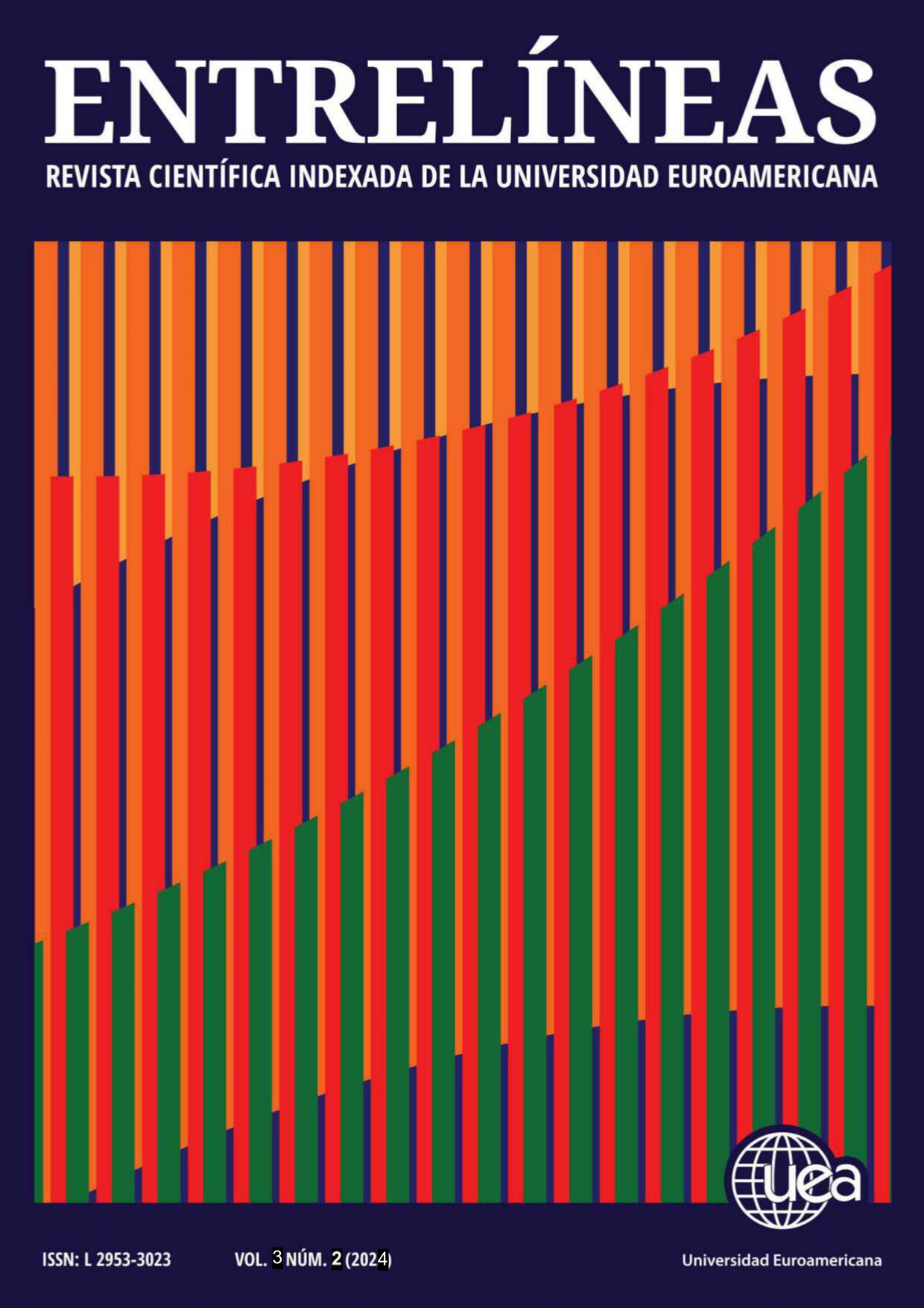University Pragmatics: Beyond Grammar Towards Communicative Effectiveness
DOI:
https://doi.org/10.56368/Entrelineas326Keywords:
communicative competence, linguistic context, language teaching, academic discourse, sociocultural pragmaticsAbstract
This study analyses university pragmatics, emphasising the necessity of transcending grammar to achieve effective communication in academic contexts. The aim of this study was to identify the primary pragmatic difficulties faced by L2 students in functioning within academic environments. The research methodology is qualitative, based on the analysis of documentary sources, employing a cross-sectional, documentary, and descriptive design without experimental interventions. The key finding was the identification of three major obstacles to the pragmatic competence of university students: difficulty in adapting the linguistic register to the contextual demands of academia, lack of understanding of the sociocultural norms implicit in academic discourse, and the inability to implement communicative strategies that facilitate negotiating meanings, reformulating ideas, or resolving conflicts in academic debates. The principal conclusion is that inadequate pragmatic competence negatively impacts student performance, limits participation in fundamental academic activities, and creates a perception of unprofessionalism that may lead to isolation and restricted learning opportunities.
Downloads
References
Bardovi-Harlig, K. & Bastos, M-T. (2011). Proficiency, length of stay, and intensity of interaction and the acquisition of conventional expressions in L2 pragmatics. Intercultural Pragmatics, 8(3), 347-384. https://doi.org/10.1515/iprg.2011.017
Bardovi-Harlig, K. & Dörnyei, Z. (1998). Do Language Learners Recognize Pragmatic Violations? Pragmatic versus Grammatical Awareness in Instructed L2 Learning. TESOL Quarterly, 32(2), 233–262. doi:10.2307/3587583
Bardovi-Harlig, K. (1996). Pragmatics and Language Teaching: Bringing Pragmatics and Pedagogy Together. In L. Boulton (ed.). Pragmatics and Language Learning (21-39), Plus Postage.
Chen, Y-S., & Wu, H-J. (2022). Developing Sustainable Email Pragmatic Competence for EFL Learners through Reformulation. Sustainability, 14(24), 16868. https://doi.org/10.3390/su142416868
Chiu, E. F.-Y., Chen, Y.-S., & Tai, H.-Y. (2022). Investigations into EFL Students’ Pragmatic and Grammatical Awareness through Peer Collaboration. Sustainability, 14(17), 10568. https://doi.org/10.3390/su141710568
Crystal, D. (2011). A dictionary of linguistics and phonetics. John Wiley & Sons.
Dozie, C. P., Ekwuribe, C. F., & Ajileye, M. O. (2023). Turns, Turn-Taking, and or Interruptions! a Pragmatic Approach to Discourse. International Journal of Scientific Research in Education, 16(4), 439-446. https://www.ijsre.com.ng/assets/vol.%2C-16(4)-chinomso-patricia-dozie-et-al.pdf
Hymes, D. (1972). On communicative competence. Sociolinguistics. In .B. Pride & J. Holmes (eds), Sociolinguistics. Selected Readings, (269-293) (Part 2), Penguin. https://wwwhomes.uni-bielefeld.de/sgramley/Hymes-2.pdf
Ishihara, N., & Cohen, A. D. (2010). Teaching and Learning Pragmatics: Where Language and Culture Meet. Routledge.
Kasper, G. (1988). Variation in interlanguage speech act realization. University of Hawai'i Working Papers in ESL, 7(2), 117- 142. https://scholarspace.manoa.hawaii.edu/server/api/core/bitstreams/6fb05756-15b8-4969-a99e-41dbc26b761b/content
Kasper, G., & Rose, K. R. (2002). Pragmatic development in a second language. Language learning.
Leech, G. N. (2016) [1983]. Principles of pragmatics. Routledge. https://doi.org/10.4324/9781315835976
Levinson, S. C. (1983). Pragmatics. Cambridge UP.
Liu, M., & Du, N. (2024). A Study of Chinese University Students’ English Learning Motivation, Anxiety, Use of English and English Achievement. Sustainability, 16(19), 8707. https://doi.org/10.3390/su16198707
LoCastro, V. (2012). Pragmatics for Language Educators. A Sociolinguistic Perspective. Routledge.
Melguizo Moreno, E. (2017). Dificultades pragmáticas en estudiantes universitarios: una aproximación didáctica. In Entornos y estrategias educativas para la inclusión social (pp. 183-190). Comares.
Moyón-Coronel, E. G., Montero-Ramírez, I. S., Briones-Suárez, K. B., & Aldean-Tumbaco, C. A. (2024). Pragmática y uso de lenguaje en estudiantes. MQRInvestigar, 8(2), 3944–3961. https://doi.org/10.56048/MQR20225.8.2.2024.3944-3961
Müller, S. (2005). Discourse markers in native and non-native English discourse. Torrossa.
Nguyen, T. T. M., Pham, T. H., & Pham, M. T. (2012). The relative effects of explicit and implicit form-focused instruction on the development of L2 pragmatic competence. Journal of pragmatics, 44(4), 416-434. https://doi.org/10.1016/j.pragma.2012.01.003
Pranowo, P. (2020). The role of context in the interpretation of pragmatic meaning. Retorika: Journal Bahasa, Sastra, dan Pengajarannya, 13(2), 256-267. https://doi.org/10.26858/retorika.v13i2.12666
Prieto, C., Sepúlveda, C. & Soto, G. (2021). Instrumentos de evaluación pragmática y comunicativa en español. Logos Revista de Lingüística, Filosofía y Literatura, 31(1), 3-25. https://dx.doi.org/10.15443/rl3101
Rose, K. R., & Kasper, G. (Eds.). (2001). Pragmatics in language teaching. Cambridge University Press.
Taguchi, N. (2011). Teaching pragmatics: Trends and issues. Annual review of applied linguistics, 31, 289-310. https://doi.org/10.1017/S0267190511000018
Taguchi, N. (2020). Digitally mediated remote learning of pragmatics. Foreign Language Annals, 53(2), 353–358. doi:10.1111/flan.12455
Taguchi, N. (2022). Teaching and learning pragmatics. In E. Hinkel (ed.), Handbook of Practical Second Language Teaching and Learning, (499-512). Routledge.
Taguchi, N., Tang, X., & Maa, J. (2019). Learning how to learn pragmatics: Application of self-directed strategies to pragmatics learning in L2 Chinese and Japanese. East Asian Pragmatics, 4(1), 11–36. 10.1558/eap.38207
Tai, H-Y., & Chen, Y-S. (2021). The Effects of L2 Proficiency on Pragmatic Comprehension and Learner Strategies. Education Sciences, 11(4), 174. https://doi.org/10.3390/educsci11040174
Takahashi, S. (2012). Pragmatic Awareness in Second Language Learning. In C. Chapelle, The Encyclopedia of Applied Linguistics || Pragmatic Awareness in Second Language Learning, (1-6). 10.1002/9781405198431.wbeal0926
Thomas, J. (1983). Cross-cultural pragmatic failure. Applied linguistics, 4(2), 91-112. https://doi.org/10.1093/APPLIN%2F4.2.91
Thomas, J. (2014). Meaning in interaction: An introduction to pragmatics. Routledge.
Yule, G. (2007). El lenguaje. Ediciones Akal.
Downloads
Published
Issue
Section
License

This work is licensed under a Creative Commons Attribution-NonCommercial 4.0 International License.
You are free to:
- Share — copy and redistribute the material in any medium or format
- Adapt — remix, transform, and build upon the material
- The licensor cannot revoke these freedoms as long as you follow the license terms.
Under the following terms:
- Attribution — You must give appropriate credit , provide a link to the license, and indicate if changes were made . You may do so in any reasonable manner, but not in any way that suggests the licensor endorses you or your use.
- NonCommercial — You may not use the material for commercial purposes .
- No additional restrictions — You may not apply legal terms or technological measures that legally restrict others from doing anything the license permits.










